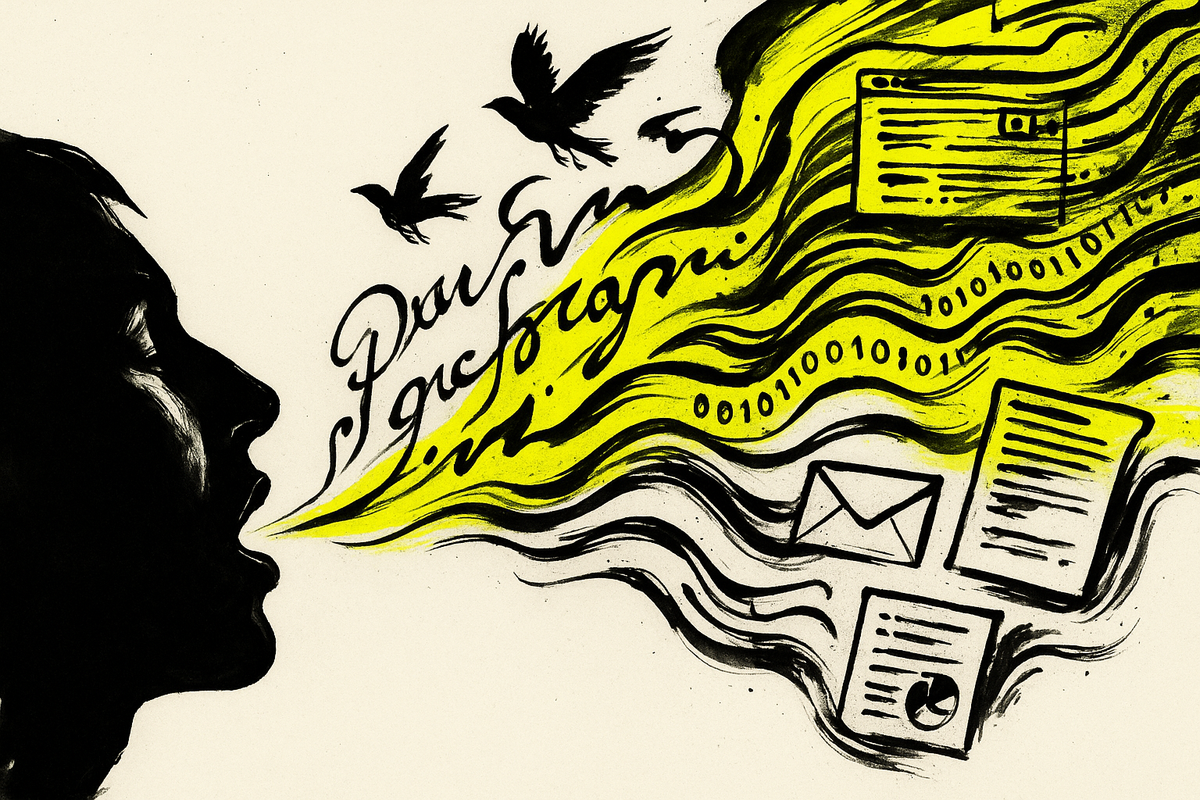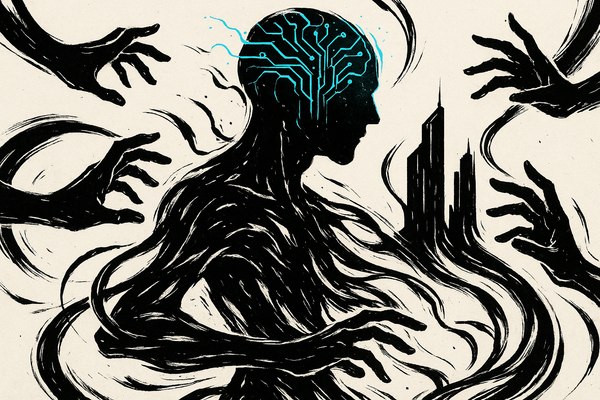ImaginEconomy Daily #6
Voice Unchained: The Death of Typing Has Already Begun

ImaginEconomy 🧠 ✨ 💰: Brands, Strategy, Story and Design in the Age of AI
Voice Takes Flight: Wispr Flow Brings AI Dictation to Desktop
Following its $30M Series A from Menlo Ventures, Wispr Flow has launched its desktop app for Mac and Windows, promising to make keyboards obsolete. The AI-powered dictation tool lets users speak naturally while working in any app—from Slack to code editors—capturing speech 4x faster than typing with automatic formatting, tone matching, and support for over 100 languages. Early adopters include VCs who claim they're using it more than their keyboards.
ImaginEconomy Impact: The death of typing is coming for great many use cases as we at ImaginEconomy are already experiencing in our daily work. For creative teams, this changes the workflow equation. Imagine briefing campaigns at the speed of thought, drafting copy, art and experiences while walking, or capturing client feedback in real-time without breaking eye contact. Voice interfaces democratize creation even further. Suddenly, your best ideas aren't bottlenecked by your typing speed or dyslexia. Agencies that embrace voice-first workflows will move at the speed of conversation while others are still pecking at keyboards. The question isn't whether to adopt voice AI. It's whether you'll lead or follow.
Source: TechCrunch on Wispr Flow funding
The Synthetic Empathy Revolution: When AI Learns to Feel (Sort Of)
The race to build emotionally intelligent AI is accelerating, with new tools and benchmarks focused entirely on making machines understand human emotions. LAION's new EmoNet suite analyzes emotions from voice and facial data, while studies suggest AI models can now detect emotional states with 80% accuracy, outperforming humans in certain contexts. But this isn't real empathy. It's synthetic empathy, a sophisticated mimicry that raises profound questions about trust, manipulation, and the nature of human connection.
ImaginEconomy Impact: Welcome to the uncanny valley of emotions, where your brand's AI knows you're sad but doesn't actually care. For marketers, this creates an ethical minefield: emotionally intelligent AI can dramatically improve customer experience, but it can also manipulate vulnerable consumers. The opportunity lies in transparency: brands that clearly communicate their AI's synthetic nature while using emotional intelligence to genuinely help (not exploit) will build deeper trust. Think AI that detects customer frustration and immediately connects them to a human, not AI that fakes sympathy to upsell. In the age of synthetic empathy, authenticity isn't about having real emotions—it's about being honest about not having them.
Source: TechCrunch on empathetic language models
The AI-CX Revolution: When Bots Become Brand Ambassadors
New research shows AI is fundamentally reshaping customer experience, with companies using AI-powered chatbots and agents to handle everything from sales to support. But the most successful implementations aren't replacing humans; they're amplifying them. AI handles the repetitive and grudging tasks while humans focus on building meaningful relationships and creating a pleasant customer experience, creating a hybrid model that's both efficient and empathetic.
ImaginEconomy Impact: As we keep repeating, the future of brand experience isn't human or AI. It's both, orchestrated brilliantly. While everyone's racing to automate customer touchpoints, the real winners are designing AI that makes human interactions more human. Think AI that briefs your service team on a customer's emotional state before they pick up the phone, or bots that know when to gracefully hand off to a person. The brands that win won't be those with the smartest AI, but those who use AI to make every human touchpoint feel like magic. Your advantage won't be AI. It will be building an AI-human system with a soul.
Source: Monday.com on AI Customer Experience
AI's Copyright Reckoning: What Recent Rulings Mean for Creative Work
Recent court rulings in favor of Anthropic and Meta have sparked debate about AI and copyright, but remarkably little has been settled. The legal landscape remains murky, with courts struggling to apply century-old copyright law to AI training practices. While some see these rulings as victories for AI companies, the uncertainty, for example between the federal and state levels in the US, continues to create risk for both AI developers and content creators.
ImaginEconomy Impact: Legal ambiguity is the enemy of creative confidence. For agencies and brands using AI, this ongoing uncertainty means every generative campaign could be a legal landmine. The smart play? Build your own defensible content moats. Instead of relying on AI trained on scraped data, invest in proprietary datasets, licensed content, and clear attribution chains, as well as bespoke processing and workflows. The brands that document their AI training sources today won't be scrambling when legal hammers fall. In the wild west of AI copyright, the only protection is radical transparency and preparation.
Source: MIT Technology Review on AI copyright lawsuits
Construction Gets Smart: How Generative AI is Building Safer Sites
Generative AI is entering the construction industry with promises to reduce workplace accidents through predictive analytics and real-time safety monitoring. The technology can analyze site conditions, worker movements, and equipment usage to flag potential hazards before they become accidents. But even with this 'Minority Report for build sites,' experts warn against replacing human safety supervisors entirely.
ImaginEconomy Impact: This isn't just about construction. It's a preview of AI's role in every physical industry. For brands in manufacturing, retail, or any space where physical and digital collide, the lesson is clear: AI excels at pattern recognition and prediction, but human judgment remains irreplaceable for context and ethics. The opportunity lies in AI that enhances human expertise rather than replacing it. Imagine retail AI that predicts customer flow to prevent Black Friday stampedes, or event AI that spots crowd dynamics before they become dangerous. The future belongs to brands that use AI to make physical spaces as smart as digital ones, without losing the human touch that keeps them safe.
Source: MIT Technology Review on AI in construction safety
The Data Center Cleanup: When Battery Recyclers Meet AI's Dirty Secret
Redwood Materials, known for EV battery recycling, is pivoting to help clean up AI data centers by repurposing batteries to build renewable-powered microgrids. As AI's energy demands skyrocket, the company sees an opportunity to address the industry's sustainability crisis while creating a new revenue stream from the intersection of AI infrastructure and green technology.
ImaginEconomy Impact: AI isn't powered by magic, but by massive energy consumption. For brands, this creates both risk and opportunity. The risk: being associated with AI's carbon footprint as consumers become more climate-conscious. The opportunity: pioneering sustainable AI practices before regulation forces your hand. Smart brands will start asking their AI vendors about energy sources, exploring edge computing to reduce data center dependence, and building "green AI" into their sustainability narratives. In a world where every brand claims to be eco-friendly, being genuinely sustainable in your AI usage could be your differentiator.
Source: TechCrunch on battery recycling for AI data centers
Bottom Line: The Age of AI Accountability
Today's stories reveal a turning point: the free-for-all era of AI is ending, replaced by an age of accountability. From voice interfaces that democratize creation to copyright confusion and sustainability issues, we're watching the AI industry grow up in real-time.
The thread connecting these stories? Control. Control over data, over interfaces, over legal risk, over environmental impact. The brands that thrive won't be those with the most AI, but those with the most thoughtful AI: tools and strategies that enhance human capability while respecting the resources, rights, and relationships that make business human.
As we move from AI's wild west to its regulated reality, the winners will be those who saw the sheriff coming and got their house in order. The future belongs to brands that humanize their workflows even further with voice, pay for their data, and green their infrastructure.
ImaginEconomy Daily Newsletter is curated for brand, business and marketing strategists, creatives, and leaders navigating the intersection of technology and human experience.




